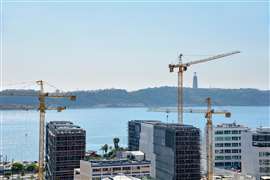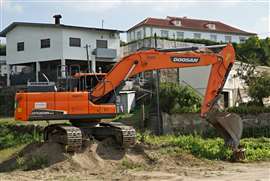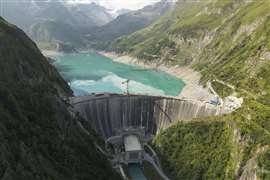Read this article in Français Deutsch Italiano Português Español
Portugal’s fractured election result could reshape housing, infrastructure policy
29 May 2025
Portugal’s 18 May snap legislative election resulted in a fragmented parliament, raising uncertainty over the country’s infrastructure pipeline. Despite the centre-right Democratic Alliance (AD) winning the most seats, the lack of a clear majority has left the formation of a new government in flux.
 Luís Montenegro, candidate for the Democratic Alliance (AD), delivers a statement following the election victory results in Lisbon, Portugal, on 18 May, 2025. (Image: Luis Boza/NurPhoto/Reuters Connect)
Luís Montenegro, candidate for the Democratic Alliance (AD), delivers a statement following the election victory results in Lisbon, Portugal, on 18 May, 2025. (Image: Luis Boza/NurPhoto/Reuters Connect)
Back in March, the country’s elections ushered in a centre-right government for the first time in nearly a decade, but a vote of no confidence collapsed that effort before a new round of voting was held earlier this month.
The centre-right Democratic Alliance (AD), led by Luís Montenegro, won the most seats but fell short of a majority, securing 89 in the 230-seat Assembly. The Socialist Party (PS) trailed with 58 seats, while far-right Chega matched that number, a big rise from its 2022 showing. Liberal Initiative and the Left Bloc followed with 8 and 5 seats, respectively.
The outcome will have immediate implications for contractors, developers, and investors in the country’s housing and infrastructure sectors, experts said.
AD campaigned on a platform that included cutting VAT on new housing, reducing planning bottlenecks, and boosting private investment incentives. In contrast, PS had supported rent controls and greater public housing investment, while Chega’s focus on limiting immigration has raised concerns about future labour availability in construction.
What the combination of parties working together, or what a minority government can achieve, for construction will be the next major question. Gonçalo Peixoto - head of operations for real estate firm BE Global Properties, based in Lisbon, Portugal - spoke with Construction Briefing about the results, and what could be next.
Portugal’s contractors “relieved” by election results
 Aerial view of Lisbon, Portugal. Image: Adobe Stock
Aerial view of Lisbon, Portugal. Image: Adobe Stock
Peixoto said many contractors are “quietly relieved” by the result, even if coalition talks remain unsettled. He believed most in the industry cast votes for AD and IL “due to the fact that [they] are the main ones defending that taxes should be lowered to allow the construction industry to grow again.”
Forming the new government may still take weeks. AD is expected to attempt forming a minority government, possibly with support from Liberal Initiative, but will likely need issue-by-issue backing from other parties to pass legislation. As of 27 May, Montenegro has ruled out forming a collation government with Chega, which could further delay the formation of a new government.
Still analysts believe contractors and constructors should get favourable news regarding loosening regulations, with either a minority or coalition government.
With housing affordability also at the centre of political debate, the construction industry is watching closely as formation talks unfold and economic priorities are reshaped.
A political reset for housing and infrastructure
 Construction in Portugal. Image: Adobe Stock
Construction in Portugal. Image: Adobe Stock
“Housing is a very big deal at the moment,” said Peixoto. “We have on the one hand housing prices higher than we’ve ever seen and, on the other hand, developers that are struggling to keep their costs as low as possible due to rising construction prices, lots of red tape and bureaucracies when it comes to licensing and increasing difficulty in hiring and retaining talent.”
Peixoto said “red tape” was common in licensing, and rolling back some of those barriers would help construction find more solutions to a burgeoning housing crisis.
“There’s no question that we are lacking housing now, but we are also lacking some instrumental parts of the recipe that allows for a healthier and quicker construction industry,” Peixoto added.
The centre-right AD and its likely allies campaigned on reducing VAT for new housing, easing licensing bottlenecks, and creating tax incentives to boost supply.
By contrast, left-wing parties pushed for rent caps, public housing expansion, and restrictions on foreign ownership, which will remain priorities in this bloc.
Far-right Chega, now with 50+ seats, campaigned on tighter labour access and immigration laws, while also supporting regulatory easing.
But Chega brings with it hardline immigration policies, which Peixoto said is worrying to portions of the industry.
“Some are definitely struggling with hiring and retaining talent, so the idea of bringing workers from abroad makes a lot of sense. They might [have been] scared away from parties like Chega that defend the exact opposite,” he said.
Rising material costs are another factor, with contractors drawn toward parties proposing tax relief and simplification of procurement and permitting.
All these factors plus a mix of political parties that can’t agree on causes or solutions could create additional stress on the industry.
“There are a lot of... studies made that sustain that this is the problem,” Peixoto said. “But unfortunately... [no] agreed solution between everyone exists, and this is mainly because not everyone agrees on what created the problem in the first place.”
A fragmented parliament in Portugual, but a clear signal for construction
 A Doosan excavator works a residential site in Portugal. Image: Adobe Stock
A Doosan excavator works a residential site in Portugal. Image: Adobe Stock
Still no party holds an outright majority, but most agree on the fundamentals: Portugal needs more housing, faster permitting, and better coordination between public and private sectors.
The disagreement lies in how to do it and who bears the cost.
The 2025 election has underscored the complexities of Portugal’s political landscape, and the construction and infrastructure sectors are at a crossroads, awaiting clarity on the new government’s composition and policy direction.
While the Democratic Alliance’s platform promises regulatory easing and incentives for development, the path to implementing these policies remains uncertain amidst ongoing negotiations.
Industry stakeholders are cautiously optimistic that, regardless of the eventual government formation, the pressing need for housing and infrastructure development will drive policy decisions.
The coming weeks will be critical in determining whether Portugal can navigate its political fragmentation to deliver on the infrastructure promises that are vital for its economic growth and social stability.
Peixoto noted, “These elections are very important for anyone in this industry, as it is for pretty much any other sector in the country at the moment.
“There’s no question that we are lacking housing now, but we are also lacking some instrumental parts of the recipe that allows for a healthier and quicker construction industry. As such, developers and all the other stakeholders need to be up to date with the politics that are being put in force for the future of the country that can very much impact the growth for the next years to come.”
STAY CONNECTED


Receive the information you need when you need it through our world-leading magazines, newsletters and daily briefings.
CONNECT WITH THE TEAM














